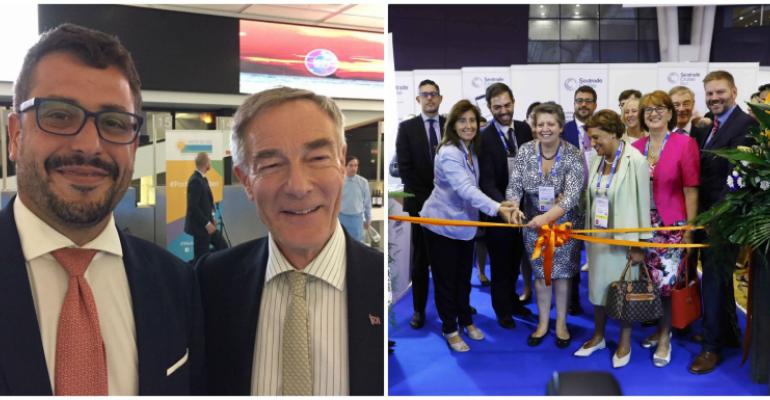Fortunately, he continued to share with the more than 350 delegates some more extensive remarks on the reasons for this and the opportunities and challenges ahead.
Europe source market has been capacity-constrained
‘Last year, 26.7 million cruises were taken the world over, 6% growth over the previous year. Assuming occupancy levels remain broadly the same this year, over 28 million cruises will have been sold in 2018, a further 5% growth.
‘European source market growth has continued steadily and, if anything, has been capacity-constrained due to the redeployment of some ships to Asia. In 2017, 26% of global cruise passengers were from Europe, but we comfortably predict that this will rise to 28% in 2018-19 as more capacity begins to rise again.’
Dingle credited the growth 'almost entirely due to the virtuous business circle which we enjoy.’
He continued, ‘Our constant stream of new and very often bigger ships offers ever more variety and excitement. A shiny new cruise ship packed with new experiences has enormous emotional pull.’
Being constantly imaginative, innovative and adventurous
Questioning what needs to be done differently in the future, Dingle offered: ‘That’s an easy one to answer, because it is the very fact that we keep on doing things differently which brings about our success. For me, being constantly imaginative, innovative and adventurous is the way that we will comfortably fill the record number of new ships already on order for the next eight or so years. We must be imaginative in how we provide even better products and service standards to our guests, innovative in the digitalisation of our front-of-house and back-of-house, and adventurous in the ports and destinations to which we send our ships and the new markets which we target,’ he remarked.
Europe’s healthy situation comes from source market growth, more cruise operations in Europe and more cruise shipbuilding, which has increased by more than 22% compared with 2015, 'a remarkable 66 new ships by 2021 worth almost €30bn.’
Turkey, Tunisia, Egypt are missed in the cruise charts
Dingle stressed, ‘If there has been any brake on the European cruise industry in the last few years, it is most likely to have been a geopolitical one.’
He added, ‘The unsettled nature of certain Mediterranean countries—Egypt, Tunisia and, particularly, Turkey—has limited itinerary variety and taken some big-name ports off the map. Concerns over Turkey have also constrained activities in the Black Sea, alongside the somewhat incongruous restrictions on visiting Crimea.’
So the first steps in the return of cruise shipping to southwest Turkey are to be welcomed, Dingle said, even if Istanbul is yet to be considered entirely safe, and 'we can be hopeful that Tunisia will soon see a similar move. It is too early to comment on Egypt.
‘It is also encouraging to see cruise calls to Israel increasing. We can but hope for a time when the whole of the Mediterranean and the Black Sea is open for business, but that is something beyond our own influence.’
Seven new cruise terminals in a year
Following on stage, Airam Diaz Pastor, MedCruise chairman, said, ‘The Mediterranean is facing a bright future with more capacity arriving and more investment in port infrastructure.’
He spoke of seven new cruise terminals which have come on stream across the region in the past year and also the Mediterranean ports' drive to offer LNG bunker facilities either shore to ship or ship to ship.
Diaz Pastor also said the return of land-based tourism growth in Turkey, Tunisia and Egypt in the past year bodes well for a revival of cruise tourism in the near future.
For live updates from Seatrade Cruise Med, click here
Copyright © 2024. All rights reserved. Seatrade, a trading name of Informa Markets (UK) Limited. Add Seatrade Cruise News to your Google News feed.


